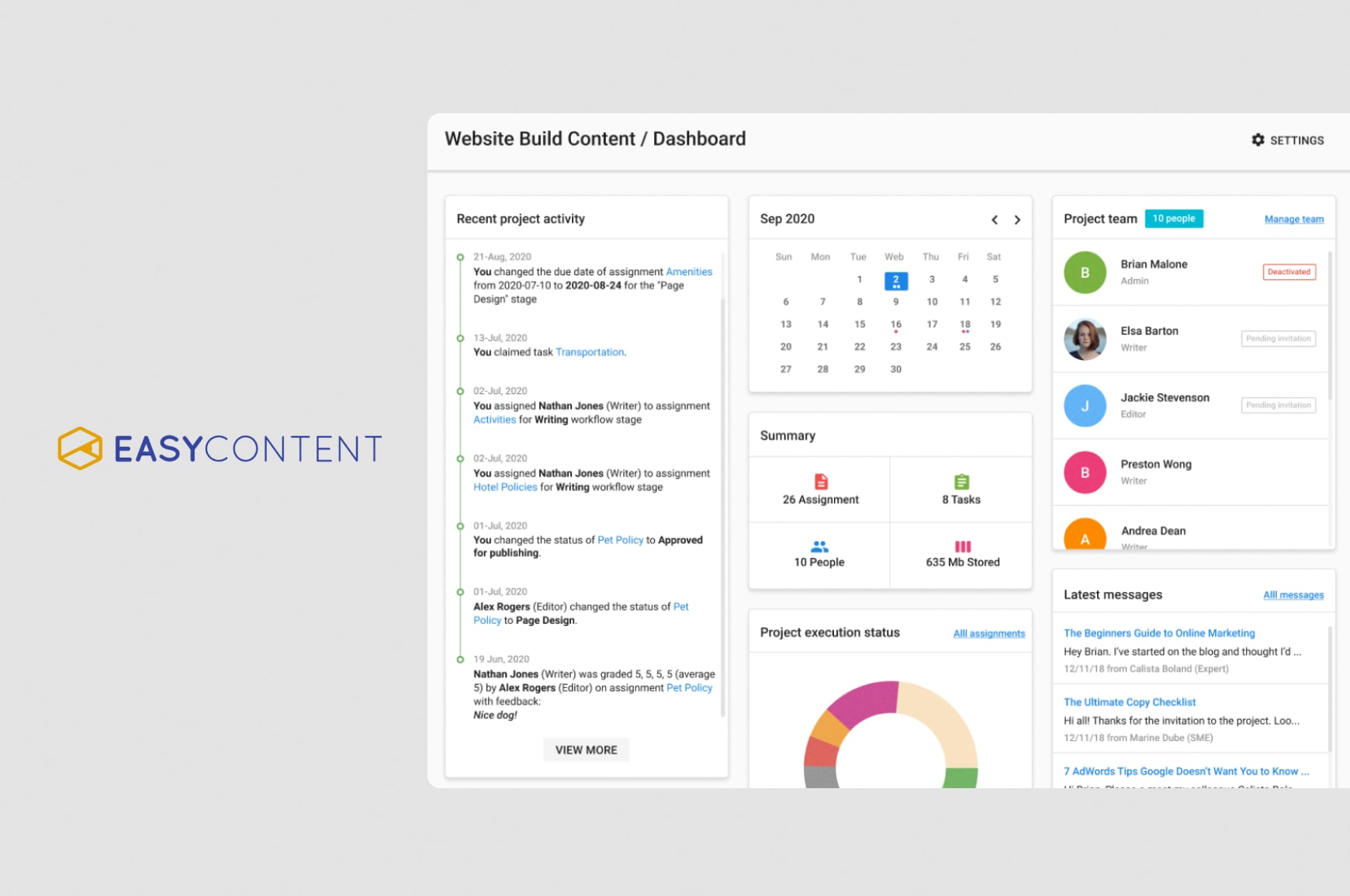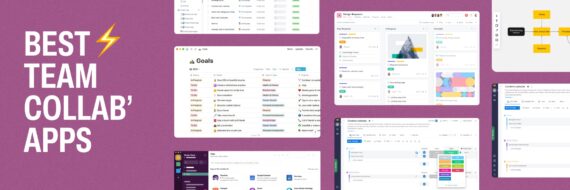Are you on the hunt for the best GatherContent alternatives to streamline your content management process? We’ve got you covered! In this article, we’re breaking down the top 10 tools that’ll help your team be more efficient and organized en route to creating stronger content.
- Slickplan: Best overall content planning alternative
- Content Snare: Best for gathering content from clients
- Narrato: Best for AI-driven content workflows
- Notion: Best all-in-one workspace
- Asana: Best for project management
- Trello: Best for simplicity and visual workflow
- Contentful: Best for headless CMS users
- Monday.com: Best for cross-team collaboration
- EasyContent: Best for structured content approval workflows
- StoryChief: Best for content marketing
Why look beyond GatherContent?
GatherContent was a champ at organizing content creation with templates, workflows and integration with various content management systems.
We say "was" because GatherContent is no longer a standalone app; it was acquired back in 2022 and is now part of the Bynder family of tools. Which is great if you’re willing to fork over a pretty penny for an enterprise-level data asset management platform.
These options offer similar (or better) functionality to help you execute your content strategy effectively.
Here’s the lineup of the best GatherContent alternatives.
1. Slickplan — Best overall content planning alternative

Rating: ⭐⭐⭐⭐½ — Top-tier content gathering and workflow tool
Overview: Slickplan is an all-in-one content planning and collaboration tool that’s part of a larger website planning suite that gives you complete control over your content creation process.
It centralizes content gathering, editing, and organization for web pages and projects of any size. You can think of it as a content operations platform that blends sitemapping, a content planning tool and publishing into one hub with direct integration to CMS platforms like WordPress, Drupal and Joomla.
The Content Planner is a collaborative content editor that supports rich text, images and various file types, eliminating the need to juggle multiple Google Docs. Plus, there’s a brand-new release coming in 2025!
Price: Starts at $31.49/month
Standout strength: A complete content workflow management system for web projects from sitemapping to user flows to content.
| Pros | Cons |
|---|---|
| All-in-one content and website planning platform | Geared more toward structured content on websites |
| Set due dates, custom user roles, leave comments and manage your team | If you’re only creating content, you may not need website planning tools |
| Flexible and scalable for small businesses to large agencies | AI for sitemapping but not content creation |
🎬 Learn what Slickplan can do!
We filmed a short video to show you exactly how to use Slickplan
2. Content Snare — Best for gathering content from clients

Rating: ⭐⭐⭐⭐☆ — Client content hero
Overview: Content Snare is the most similar to GatherContent on our list and shines in making content requests from clients pain-free.
It’s a simple process using a Kanban-style approach to content collection. Clients don’t even need to log in to submit content; you set up a request for what’s needed with a drag-and-drop builder, put guidelines in place and they respond with whatever is requested.
As far as content planning tools go, it’s not the most robust but it does serve its purpose very well.
Price: Starts at $29/month
Standout strength: Automated workflows and follow-ups mean you can create quality SEO content without having to navigate 50 separate email threads.
| Pros | Cons |
|---|---|
| Customizable content requests | Limited internal team collaboration |
| Automated follow-ups | Specific to gathering content, limited function beyond that |
| An intuitive Kanban-style user interface | No content editor |
3. Narrato — Best for AI-driven content workflows

Rating: ⭐⭐⭐⭐½ — AI meets content production
Overview: Narrato is an AI-fueled content platform, an all-in-one tool that’s built to take you and your team from idea to creation to content publishing.
In addition to AI-assisted content optimization, they have a marketplace of freelance talent alongside collaborative workflow tools where you can get matched with writers to
Narrato includes a content editor with SEO and readability suggestions, plagiarism checks, an AI brand voice generator and an AI content genie that ideates and creates blogs and social posts aligned with your target audience. For more on how AI supports content creation, see our AI tools for content creation.
Price: Starts at $36/month
Standout strength: Intelligent AI tools help you create and manage content production.
| Pros | Cons |
|---|---|
| Deep AI integration to create custom content workflows | AI ain’t magic, overreliance can lead to vanilla content |
| Marketplace of writers to create content | Content gathering capabilities not very clear |
| End-to-end digital ecosystem for creating content | Steeper learning curve given all the features |
4. Notion – Best all-in-one workspace

Rating: ⭐⭐⭐⭐☆ — Versatile and highly customizable
Overview: Notion is an uber-flexible content operations platform that integrates content gathering, task tracking and a sleek content editor into one workspace. Their AI agent is a powerful addition for $8/month extra.
Teams can use one of the 3,000+ templates ranging from digital asset management to personal planners and content templates to gather what’s needed.
Build editorial calendars to track project progress and use workflow tools to organize efficiently. It’s an excellent choice for content marketers who want an all-in-one workspace for planning, execution and documentation.
Price: Free; Paid plans start at $10/month
Standout strength: Combines project management, content planning and collaboration in a single, intuitive tool.
| Pros | Cons |
|---|---|
| Fully customizable workspaces for content strategy | Can be complex for new users |
| Integrated task management for content teams | Limited content storage |
| Supports real-time collaboration | Lacks direct CMS integrations |
5. Asana — Best for project management

Rating: ⭐⭐⭐⭐½ — Workflow wizard
Overview: Asana is a powerhouse among the project management tools for content teams.
With its project views, including Kanban, list, timeline, calendar or Gantt chart, you can track all of your content development, whether it’s one project or one hundred, with ease. Nice flexibility that GatherContent didn’t have.
Their Workflow Builder helps you coordinate tasks and create a more efficient workflow for your team by automating processes, organizing work and streamlining projects.
Price: Free for small teams; Paid starts at $10.99/month
Standout strength: A feature-filled project management solution with automation to keep content teams with multiple content projects on track.
| Pros | Cons |
|---|---|
| Workflow management that includes task and workload tracking | Not specifically designed for content creation |
| Custom dashboards for content marketing strategy | Can feel complex for newcomers, better for larger teams |
| Automates project progress tracking | Has storage but file size is limited to 100 MB |
6. Trello — Best for simplicity and visual workflow

Rating: ⭐⭐⭐⭐☆ — Intuitive, effective and easy to use
Overview: Confession: We love Trello here at Slickplan. It’s stellar for collecting content and managing projects with an incredibly simple Kanban user interface that makes tracking projects and individual content tasks a breeze.
Trello’s drag-and-drop card system allows for seamless collaboration, making it a go-to for smaller content teams that prefer minimal setup and an easy-to-use task management system.
Plus, their Butler tool is a powerful no-code automation that allows you to speed up your projects.
Great for anyone looking for a GatherContent alternative with a simple way to manage projects visually and a genuinely excellent free plan.
Price: Free; Paid starts at $5/month
Standout strength: A lightweight but powerful Kanban-based content workflow tool.
| Pros | Cons |
|---|---|
| Drag-and-drop content workflow tracking | Can get cluttered with large-scale content production |
| Simple collaboration features and an easy-to-use Kanban board | No way to create content and limited reporting |
| Free version allows for up to 10 collaborators | Limited advanced features |
7. Contentful — Best for headless CMS users

Rating: ⭐⭐⭐⭐☆ — Scalable and developer-friendly
Overview: Contentful is a headless CMS designed for structured content storage and multi-platform content publishing. It separates content management from presentation, making it ideal for teams that need an API-driven solution for distributing content across apps, websites and digital platforms.
Contentful is used by enterprises and large digital ecosystems, offering strong access control, content versioning, SEO content planning and automation tools that enable seamless collaboration across teams.
The big downside, of course, is that it’s highly technical and best suited for teams with developer resources.
Price: Free plan for up to 10 users; Paid plan starts at $300/month
Standout strength: A flexible, API-first CMS that allows content teams to manage and distribute content anywhere.
| Pros | Cons |
|---|---|
| Highly scalable for large content operations | Requires technical knowledge to set up and manage |
| API-driven, making it ideal for omnichannel content publishing | High price tag when moving up from the free small team plan |
| Strong security and access control featuress | No native frontend or SEO tools |
8. Monday.com — Best for cross-team collaboration

Rating: ⭐⭐⭐⭐☆ — Flexible and highly visual project management
Overview: Monday.com is a workflow management platform that enables team collaboration, content gathering and planning, as well as tracking and SEO project management.
Like Trello, it offers multiple project views, including Kanban, Gantt charts and calendar layouts, making it an excellent choice for content teams that need a flexible, scalable solution.
Monday.com integrates with tons of popular work apps, from communication to reporting and analytics to digital marketing tools, allowing content marketers to plan, collect content, execute and track their content progress all in one place.
Price: Free available, starts at $9/month
Standout strength: A highly visual and customizable workflow tool that adapts to content teams of any size. It’s nicknamed the WorkOS for a reason.
| Pros | Cons |
|---|---|
| More versatile for general project management, not just content | Requires more setup and customization for content teams, no content editor |
| Automates tasks and streamlines content workflow | No structured content workflows built in or CMS integration |
| Robust integrations and custom workviews | Steeper learning curve, not particularly intuitive |
9. EasyContent — Best for structured content approval workflows

Rating: ⭐⭐⭐⭐☆ — Streamlined content approvals
Overview: EasyContent is built for teams that need structured content workflows with approval tracking, custom user roles and editorial collaboration.
It ensures that approved content follows a strict review and approval process before publishing, making it a solid choice for just about everyone who requires accountability.
With custom content workflows and templates to structure content, role-based permissions and automated workflows, EasyContent helps teams manage and standardize content production. It also integrates with CMS platforms to facilitate smoother content publishing.
Price: Starts at $167/month
Standout strength: A content approval, asset management and workflow system built for teams that require oversight and compliance.
| Pros | Cons |
|---|---|
| Familiar workflow structure and version control for easy revisions | Version history only visible for up to a year on cheapest plan |
| Can build detailed workflows and editorial calendars | Workflows can only include 10 steps on the lowest tier plan |
| Digital asset management of up to 500 GB | Steep price for a familiar limited featureset |
10. StoryChief – Best for content marketing

Rating: ⭐⭐⭐⭐½ — A sweet multi-channel content marketing platform
Overview: StoryChief is more than a Bynder GatherContent alternative; it’s a loaded content marketing platform that makes it easy to plan, collaborate on and publish content across CMS platforms and your social media pages.
AI kicks things up a notch with an agent called William, as well as an AI-powered weekly content audit that helps you fill gaps. Content production with StoryChief also offers a collaborative editor, social media planning and the ability to publish to 100s of platforms.
Add analytics and reporting for both SEO and social and you can track how web pages or campaigns are doing at a glance.
Price: Free plan; Paid content marketing plans start at $59/month (social only is $39)
Standout strength : End-to-end content planning and multi-channel publishing hub.
| Pros | Cons |
|---|---|
| Multi-platform publishing saves time | Pricier base plan than some |
| SEO content editor and tools boost content optimization | Could be overkill for teams that don’t require an entire platform |
| AI-assisted writing and content auditing | Steep learning curve for newcomers |
Lock in the best GatherContent alternative
Picking the right tool for your content management process depends on you and your team.
Start with identifying your specific requirements and goals. Consider the size of your team, the complexity of your content projects and, of course, your budget. Do progress tracking, analytics and easy-to-navigate dashboards matter?
Evaluate the user interface and feel of the software, as usability can significantly impact team productivity. Decide whether you prefer a cloud-based solution for accessibility or an on-premises system for local hosting. Test things out; Slickplan offers a 14-day free trial, for example.
Integration capabilities with other tools are another critical factor. Ensure the chosen platform seamlessly integrates with your existing workflows and doesn’t create headaches.
The good news is that all the tools we mentioned here are solid GatherContent alternatives and can significantly improve your content operations.
Plan smarter content with Slickplan
A collaborative workspace to handle all your content needs. Plan, gather and create together.
Frequently asked questions
What is the main purpose of content collection and preparation for a website?
The goal of content collection and preparation is to ensure a website has well-structured, high-quality content that aligns with user needs and business objectives. It streamlines content workflows, improves SEO performance and ensures brand consistency, making the site more engaging, accessible and effective in converting visitors.
Why did GatherContent shut down as a standalone product?
GatherContent was acquired by Bynder in 2022 and integrated into its digital asset management (DAM) platform. While some of its core features remain, it's now an enterprise-level tool, making it less accessible for small teams looking for an affordable content operations solution.
Which content management tool is best for small teams?
For small teams, Trello and Notion are great free or low-cost options with intuitive interfaces and flexible workflows. Slickplan offers structured content planning, while Monday.com is great for broader project management and team collaboration with scalable pricing.
Do any GatherContent alternatives include AI?
Yes! Narrato and StoryChief both offer AI-powered content generation and optimization. Narrato includes AI-assisted writing and a marketplace for hiring writers, Slickplan has an AI sitemapping assisting, while StoryChief provides AI-powered content audits and multi-channel publishing tools to boost content performance.
Which alternative integrates best with CMS platforms?
If CMS integration is a priority, consider Slickplan, Contentful or StoryChief. Slickplan connects seamlessly with WordPress, Joomla and Drupal; Contentful is a headless CMS offering flexible content delivery and StoryChief supports multi-channel publishing directly to websites, blogs, and social platforms.






 X
X

